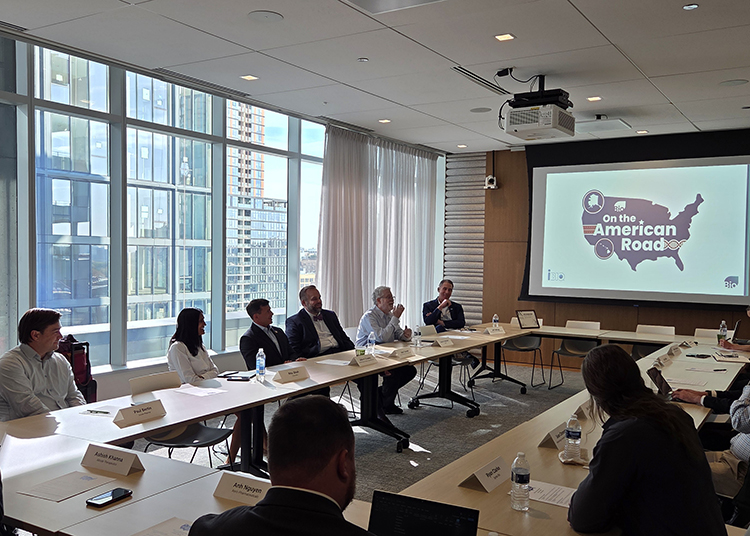Already providing employment for 129,245 people and $95 billion in annual economic output, Texas’s biotech sector is growing rapidly.
That sector will be highlighted Sept. 15-16 during a visit by a team from the Biotechnology Innovation Organization (BIO), led by BIO President & CEO John F. Crowley, as part of the BIO on the American Road series.
Crowley will hear from leaders in Houston and Dallas while participating in panels, workshops and discussions on biosecurity, patient access to medicine, policy, and the growth of biotech in Texas.
The BioNTX iC³® Life Science & Healthcare Innovation Summit in Dallas will see Crowley receive the Dennis K. Stone Award. BioNTX’s highest recognition, the award is presented annually to an individual whose career embodies scientific excellence, visionary leadership, and a profound commitment to advancing human health.
Houston ‘a hidden gem’
BIO’s Texas trip begins Sept. 15 in Houston, where there will be a workshop on “Enhancing U.S. Biotechnology Security” at the TMC Helix Park biomedical center, with a panel including members of Rice University.
“At Rice, we see biotechnology as a strategic national asset,” said Rice University President Reginald DesRoches. “That’s why we are working not only with partners in the Texas Medical Center and the biotech industry, but also with government agencies, to ensure that cutting-edge research is translated into solutions that bolster national security. The ability to anticipate and respond to biological challenges is no longer optional — it is essential to our safety, our economy, and our future.”
BIO will meet with leaders of Houston’s biotech ecosystem, including DesRoches and Paul Wotton, who runs RBL LLC, a new biotech venture creation studio partially owned by Rice.
“Houston’s really a hidden gem,” according to Wotton. “It’s a very large gem, but what seems hidden is the competitive level of technologies available in places like the Texas Medical Center—the world’s largest medical complex—MD Anderson, Baylor, and Rice University’s chemistry group and bioengineering department.”
BIO will also meet leaders of the MD Anderson Cancer Care Center. When Wotton was CEO of Obsidian Therapeutics, he managed a partnership with MD Anderson to develop a cell therapy for patients with advanced melanoma that continues to achieve positive clinical trial data.
Now Wotton’s RBL LLC platform creates programs within Rice and other affiliated institutions to give early-stage support for promising innovations. “We cherry pick from that pool of technology programs and bring them into RBL LLC to form companies,” said Wotton. In their first year they’ve formed three new firms.
With all its strengths, Houston’s ecosystem still needs greater biotech-focused venture capital, and a larger pool of managers with experience running emerging biotechs, according to Wotton. He said he hoped the visit by BIO and Crowley would help in that regard.
“Having people like John come and visit with us is important because we want to increase the visibility of what we’re doing down here,” Wotton said. “John can help open other people’s eyes in terms of what the capabilities are here.”
North Texas: ‘An innovation renaissance’
On Sept. 16, Crowley and the BIO team will be in Dallas, where BioNTX represents the lively biotech ecosystem spread across North Texas.
“We have world-class research institutions, great healthcare facilities and universities, and a very strong entrepreneurial sector,” according to Jason Wietjes, chairman of the BioNTX Board.
“We’ve experienced exponential growth in the last 3-4 years, an innovation renaissance,” said Wietjes, explaining that much development followed completion of Pegasus Park, a 23-acre biotech and life sciences center in Dallas, where BioNTX now has offices.
With wet labs, clean rooms, and other cutting-edge facilities, Pegasus Park is attracting startups, researchers, and a new biomanufacturing hub created through a partnership between Texas A&M and the University of Texas at Arlington.
Pegasus Park is a mixed-use office campus consisting of more than 885,000 square feet of offices, labs, and amenities across multiple buildings. Developed by a local investor group in partnership with Lyda Hill Philanthropies, it has become the epicenter of North Texas’ rapidly expanding life sciences and biotech ecosystem, helping support companies at every stage to scale.
“Pegasus Park represents what is possible when investment and philanthropy come together with a shared vision. By combining LH Capital’s investment in real estate with the ecosystem building efforts of Lyda Hill Philanthropies and others, we have created more than lab and office space, we’ve built a catalyst for biotech innovation in North Texas,” said Matthew Crommett, Managing Director, LH Capital, Inc. and Lyda Hill Philanthropies.
“Pegasus Park provides a focal point,” said Wietjes, adding that developing a critical mass of biotech firms that can work together is essential to the BioNTX playbook. “Our role has always been to be a platform for collaboration, mentorship, bringing people together so that we can share ideas—functioning as a catalyst and a connector,” Wietjes said.
The iC3 summit
At the heart of BioNTX’s mission to spark collaboration is its flagship annual gathering—the iC³ Summit.
“The annual Summit allows BioNTX to bring together innovators and investors which drives collaboration,” said BioNTX CEO Kathleen Otto-Rosenblum. “Attendees have reported great experiences and the Summit continues to grow in size and geographic reach.”
Crowley’s achievements and his leadership for the industry made him a clear choice for the Dennis K. Stone Award, according to Otto-Rosenblum, who said she’s known and admired BIO’s President & CEO for years.
“Who else is the right person for our industry today?” Otto-Rosenblum asked.
Crowley founded Amicus Therapeutics in 2005 as he sought treatments for his two children, Megan and Patrick. His work opened the door to a Patient Advocacy focus and enabled his children to successfully battle Pompe disease, a rare condition.
“I watched John from the time those kids were little,” Otto-Rosenblum said. “It’s very emotional for me because I have met and spoken to Megan, and over the years I have seen her blossom. This is a beautiful story, and this is the essence of why we do what we do.”
Having a leader of Crowley’s stature visit North Texas “really connects us to the broader national community,” Otto-Rosenblum added. “It is important for the nation to see what is happening here.”
At this year’s Summit, Crowley will join panels on biosecurity and the future of the industry in Texas. “Bioscience touches everything in the 21st century, including economic development, national security, health care, the environment,” said Otto-Rosenblum. “The security of our science and bringing manufacturing back to the United States is not only critical to national security, it provides opportunities for solutions to our greatest problems and helps innovation thrive.”
Regarding the future of biotech in Texas, Wietjes ticked off a few of the region’s strengths: a focus on cell and gene therapies, a growing number of companies and research institutions, and a strong healthcare system. “Those would be the things that we think in the next ten years will be a focus of this region and our work,” he said.
A patient-centered research initiative
One local innovator speaking at the iC3 Summit will be Dr. Diana Castro, who has developed a unique model for patient-centric research as founder of Neurology & Neuromuscular Care Center and the Neurology Rare Disease Center in Denton, TX.
After working 14 years as a clinician and behind the bench at the University of Texas Southwest Medical Center, Dr. Castro wanted to do more to serve patients and advance research.
“Neuromuscular research and practice, when I started, was so limited in terms of options. And then about 15 years ago we started having the first trials coming and I saw there is hope. Hope that we can improve the quality of life for people,” said Dr. Castro. “And one of my biggest frustrations was the inability for me to see people without insurance.”
The answer: “We decided to do the clinic as a nonprofit, to be able to open it for grants, for donations. And we planned the research arm to help sustain the nonprofit. It’s been amazing.”
Donations to the clinic help cover the cost of treating patients. The clinic provides the Neurology Rare Disease Center with a pool of potential clinical trial participants who trust Dr. Castro.
“You have to create a relationship with patients to be able to get them into research,” said Dr. Castro. “There is a big distrust of research in different communities in the Hispanic community, in the Black community,” but it’s important to get diverse groups in clinical trials.
Dr. Castro gave one example of why clinical trial diversity matters: To be eligible for Duchenne gene therapy, patients must test negative for antibodies against the adeno-associated virus (AAV) that delivers micro-dystrophin. Unfortunately, about half her patients have tested positive for the antibodies, making them ineligible for the treatment.
“They said they did the study for antibody testing on 110 patients, and 99 of them were white,” Dr. Castro explained. “That was a problem because my population is 50% Hispanic, and a lot of patients are from Asia.”
Dr. Castro said she recently became involved with BioNTX and has been pleased to realize how much the connections with the local biotech community can help her in her work.
“Kathleen (Otto-Rosenblum) came to my office and told me about work being done here in Texas that I didn’t know existed,” Dr. Castro said, adding that she is now trying to take full advantage of the BioNTX network. “I’m excited because I’m sure there are many things that are done already that I don’t have to redo. This is going to be a great opportunity to advance our work.”
Policy to boost Texas biotech
Texas provides biotechs a place to thrive, according to Victoria Ford, President & CEO of Texas Healthcare & Bioscience Institute (THBI), the official BIO affiliate in Texas given their strong focus on policy advocacy in growing the industry in the state..
“Texas is one of the top five life science states in the country with a full array of services,” she said, adding, “Texas has extraordinary academic resources; more Tier 1 research universities than any other state.”
Good policy can help Texas biotech grow, according to Ford.
“THBI ensures that public policy makers understand and value the industry, that regulatory policy is reasonable and that patients’ voices are heard,” Ford said.
Priority areas THBI lists include economic development of life sciences, expanded patient access to treatments, promoting research investment and commercialization of innovation, and improving health programs for Texans.
Among several successes in the last state legislative session, THBI backed legislative approval of a bill to establish the Dementia Prevention and Research Institute of Texas, which Ford said will encourage biotech growth in Texas. Voters can approve the dementia institute’s 10-year, $3 billion budget by supporting Proposition 14 in November. The Alzheimer’s Association and other patient groups back the measure.
Ford said BIO is a valuable partner in THBI’sP advocacy. “BIO has a lobbyist in Texas who works closely with THBI and the regional policy person assigned to Texas,” she explained. “At the federal level, BIO is the primary resource THBI has for federal developments, advocacy and leadership.”
Given the importance of this partnership, Ford welcomed an opportunity to meet with Crowley in Texas. “We are glad to have a chance to show him what is happening on the ground here to help inform his work nationally.”
Pictured at top, the Texas Medical Center. Photo: Katie Haugland Bowen.




